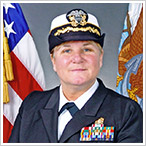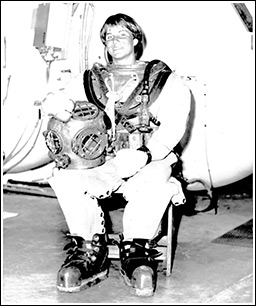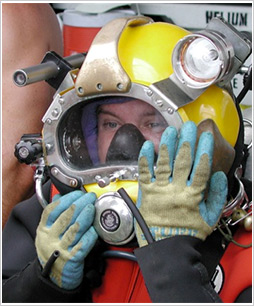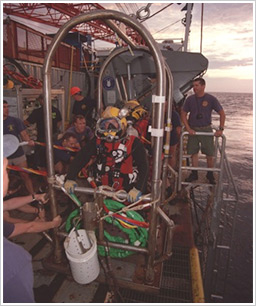Gina Harden (Part 2)
Navy Dive and Salvage Officer—Depth of Faith
By Marjorie F. Eddington
Categories: Community Service, Military, Power of Prayer Gina Harden became the seventh female U.S. Navy diver in 1982, when U.S. women were just starting to do intelligence work and support the SEALs. She helped salvage the Civil War USS Monitor in 2001-2. She was inducted into the Women Divers Hall of Fame in 2003. Her stories about her diving and salvage experiences and how she succeeds and empowers others in a male-dominated world are awe-inspiring.
 What would you say of your career with the Navy? What would you say of your career with the Navy?
It’s been rewarding, especially being able to meet so many people. I didn’t think that the dive community in the Navy would be such a big part of my life. I did four years of active duty and joined the reserves because of the attitude towards women in the military at the time. But the opportunities I been afforded in the Navy Reserves have been amazing.
What have you been able to accomplish in the Reserves?
As a Reserve, I fought to do the same type of diving that active divers do. One job I wanted to do was to clear a channel for all the small fishermen who couldn’t get through because a bridge and the 40 or so telephone pole pilings that had held it up had fallen down. The pilings would need to be cut underwater and pulled over to the bridge where they would be hauled onto a truck on the bridge. The active duty leadership thought it was too dangerous for Reserve divers. But, as the Commanding Officer of the Mobile Diving and Salvage Unit in the Reserves, I fought and won the right to do it. We used an under-water chain saw and jackhammer. With zero visibility, we shimmied down the poles, cut through them, and cleared the channel. It was a great sense of accomplishment for all the 20-30 Reserves who worked on the bridge, and for the Navy, too.
That’s pretty impressive! What’s been a highlight of your diving career?
 Well, scuba is just one piece of deep sea diving; another is salvage and recovery. I was part of the historic NOAA and Navy dive team that dove 240 feet down to recover the Civil War’s, USS Monitor, the first revolving gun turret ironclad battleship. That’s been the only time—when I was putting the helmet on to go that deep—that I have been nervous or scared. We were using a surface-supplied experimental special mixed gas and utilizing experiential dive tables while diving close to maximum depth of the dive rig. Well, scuba is just one piece of deep sea diving; another is salvage and recovery. I was part of the historic NOAA and Navy dive team that dove 240 feet down to recover the Civil War’s, USS Monitor, the first revolving gun turret ironclad battleship. That’s been the only time—when I was putting the helmet on to go that deep—that I have been nervous or scared. We were using a surface-supplied experimental special mixed gas and utilizing experiential dive tables while diving close to maximum depth of the dive rig.
We were dragging our air hose across the bottom while dealing with currents, marine life, and obstacles on the bottom, as well as potential decompression sickness. For a 20-minute dive, we spent an hour decompressing in the water and then 2 hours in a chamber. There were 40-50 of us so we could rotate out. Though only 2 divers go down, there’s a standby diver and 10-15 others supporting the dive. Plus we had saturation divers who stayed in a pressurized bell working on the bottom and were able to help divers if they got into trouble.
Once you were on the bottom, you had to work fast. You have a job to do quickly. You run to do your mission down there and run back and get back on the stage and get pulled back up to the surface. You have no time to think, only when you’re getting ready. As you go screaming to the bottom, you’re clearing your ears by putting your nose on a bar that goes in front of your face. I had more fear about failing to get to the bottom than anything else. If you don’t get there, they have to prepare another diver. As a female in a male community, you constantly have to prove that you can do it.
Did you feel stressed at all with so much on the line?
On this occasion, I was stressed more than usual because it was so important, and I was fearful. I wanted to make sure I did my piece of the job successfully, which I did. Even the guys had a hard time and as much anxiety as I did with this mission. In general, I’m pretty confident in my abilities to perform the job on equal par. So when I get the young kids asking if I can do things, it’s kind of comical. I’ve been doing this for 30 years, and they just got out of dive school.
Are there any passages from the Bible or spiritual ideas that have helped you?
 I would remind myself that I am made in God’s image (Gen 1:26). One of the ideas that really steadied me through officer candidate school, especially with all the hazing and harassment (even from the instructors) that went on, was a hymn that my mom sang to me when I was little: I would remind myself that I am made in God’s image (Gen 1:26). One of the ideas that really steadied me through officer candidate school, especially with all the hazing and harassment (even from the instructors) that went on, was a hymn that my mom sang to me when I was little:
In heavenly love abiding, no change my heart shall fear; and safe is such confiding, for nothing changes here: the storm may roar without me, my heart may low be laid; but God is round about me, and can I be dismayed? (Anna Letitia Waring, 1850)
How did you overcome the challenges of being a woman in a male-dominated world so successfully?
Being the only female going through Navy dive school was a major challenge, but it was also rewarding, both physically and mentally. I dove the Mark V rig, the type of rig used in the film Men of Honor. I dove with the SEALs (there are no women SEALs) in military exercises and served with the mobile diving and salvage unit. Swimming to me has always been therapeutic, and athleticism is a gift I’ve been afforded. Swimming has also been a time of prayer for me. So even though it was challenging, it was easier for me because of my attitude.
 Dealing with any issues, not just women’s issues, has been about faith, prayer, knowing what truth is, and trying to see other people and their attitudes as reflections of the truth. That’s what I’ve tried to do as much as I’m able. And usually when the guys got to know me, they changed their attitudes. In dive school, my classmates and I did everything together, and the guys became protective of me, which was kind of nice. The group of men and women I have met through the Navy diving community have become my greatest friends and soul mates. Dealing with any issues, not just women’s issues, has been about faith, prayer, knowing what truth is, and trying to see other people and their attitudes as reflections of the truth. That’s what I’ve tried to do as much as I’m able. And usually when the guys got to know me, they changed their attitudes. In dive school, my classmates and I did everything together, and the guys became protective of me, which was kind of nice. The group of men and women I have met through the Navy diving community have become my greatest friends and soul mates.
What do you think has contributed to your success?
I’ve been successful and attained the rank I have because of the people with whom I’ve worked. I’ve empowered them, and they’ve empowered me—like the dive team who worked on the bridge and telephone poles. They performed the work and did it well, and made me look good. It was good for the community.
And the work you do makes things good for the world! |